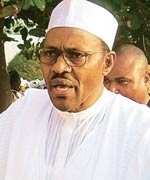The raging violence between the militant Boko Haram group and security forces in several northern states, which has claimed more than 300 lives in four days, is rooted in politics rather than religion, officials and experts believe.
"I have always believed that this group is not fighting any holy war," an aide to Bauchi State Governor Isa Yuguda told IslamOnline.net on Wednesday, July 29, requesting anonymity due to sensitivity of the issues.
At least 43 people were killed Wednesday in new clashes between security forces and the group in Yobe state. This brings to more than 300 the number of people killed in four northern states where security forces are hunting down militants who went on a violence spree since the weekend.
President Umaru Yar'Adua has vowed to crush the group, reportedly pushing for outright execution of Shari`ah and working against Western legacies.
But some politicians believe Boko Haram, whose name means "Western education is a sin" in the local Hausa dialect, is only seeking political ends.
"Their profession of Islam is merely to draw public sympathy," believes Governor Yuguda's aide. "They have an agenda to disrupt peace. Religion is just a cover to perpetrate this wicked act."
Governor Yuguda himself has earlier said that Boko Haram is motivated by reasons other than religion. "Religion is not on the card; it is only a shield to perpetrated the wicked attacks on citizens," he told a press conference.
Boko Haram was founded in 2002 in Maiduguri, the capital of Borno state, allegedly by Mohammed Yusuf, a religious teacher. It emerged in 2004 when it set up a base in Kanamma village in Yobe, on the border with Niger.
The group's membership is reportedly drawn from university dropouts with the stated mission of imposing Shari`ah across Nigeria and abolishing its Western-style education.
Selfish PoliticiansSome experts link the violence and its spread to poor governance and rising unemployment.Security expert Abiodun Aremu also sees politics in the latest attacks.
"We have looked at the pattern of this attack and discovered it is a ploy to achieve a political end," he told IslamOnline.net.
"It is clear Boko Haram is merely dropping religion as a shield and security agencies must dig deep enough to see beyond the so-called religious extremism."
Muhmmadu Buhari, former military ruler of Nigeria and leader of All Nigerian Peoples Party (ANPP), shares the same view. "As far as I am concerned, politics is a strong factor in these clashes," he told.
Buhari, a two-time presidential candidate, is urging the government to investigate the roles certain politicians played in religious violence in the country.
"It is disgusting to continue to blame religion for these crises when in actual fact certain selfish politicians are at the background".
"The earlier we dig into what roles politicians play in them the better for this country."
Bauchi state, where the violence first erupted, has been in the grip of a political crisis since Governor Yuguda defected from the ANPP to join the ruling Peoples Democratic Party (PDP).
Youth in Bauchi have gone on rampage recently to protest Yuguda’s decision.
"Don’t forget these youths threatened to hit back at Yuguda," noted Mallam Musa Gani, the Bauchi State Chairman of the Transition Monitoring Group (TMG), Nigeria’s largest network of election observers.
"Can this be their response which could cost the governor his political future? Only members of this group can say."
Joe Igbokwe, chairman of Action Congress (AC), the ruling party in Lagos and Nigeria’s main opposition platform, does not rule out a possible link.
He accused some politicians of pursuing "selfish agenda using religion to divide the masses."
Poor GovernanceOther experts link the violence and its spread to poor governance.
"The recent violence in Bauchi… underlines the increasingly precarious state of insecurity in the country," Titus Mann, a top security expert and President of the Civil Liberties Organisation (CLO), told IslamOnline.net.
"That the Bauchi mayhem could happen when the violent tendencies of the sect in question had manifested long before now in violent incidents in Borno and Yobe states, reveals the laxity on the part of the government and its security outfits."
Mann said that the Bauchi unrest comes to add to the government messy handling of security issues.
"This has come at a time when the Federal Government’s sincerity is being called to question concerning the amnesty to militants in the Niger Delta."
The government last week offered amnesty and released Henry Okah, the leader of the rebel Movement for the Emancipation of the Niger Delta (MEND).
Okah, who had been facing treason charges, was freed in exchange for a two-month truce by his group which has been attacking oil installations and kidnapping oil workers since 2006.
MEND says it is fighting for a greater share of the region's oil wealth for local communities.
"The inefficiency of the Federal Government and the security agencies is complete and frightening," says Mann.
A recent US report has listed Nigeria among world’s top failing states with symptoms such as ethno-religious violence and surge in militant activities.
"All of these are happening when no comprehensive and drastic measures are being pursued to address the ravaging and widespread incidence of unemployment and poverty," fumed Mann.
"This feeds the many sorts of ethnic, religious and communal and other crises that all too frequently break out into violence in different parts of the country."
Related Links:



